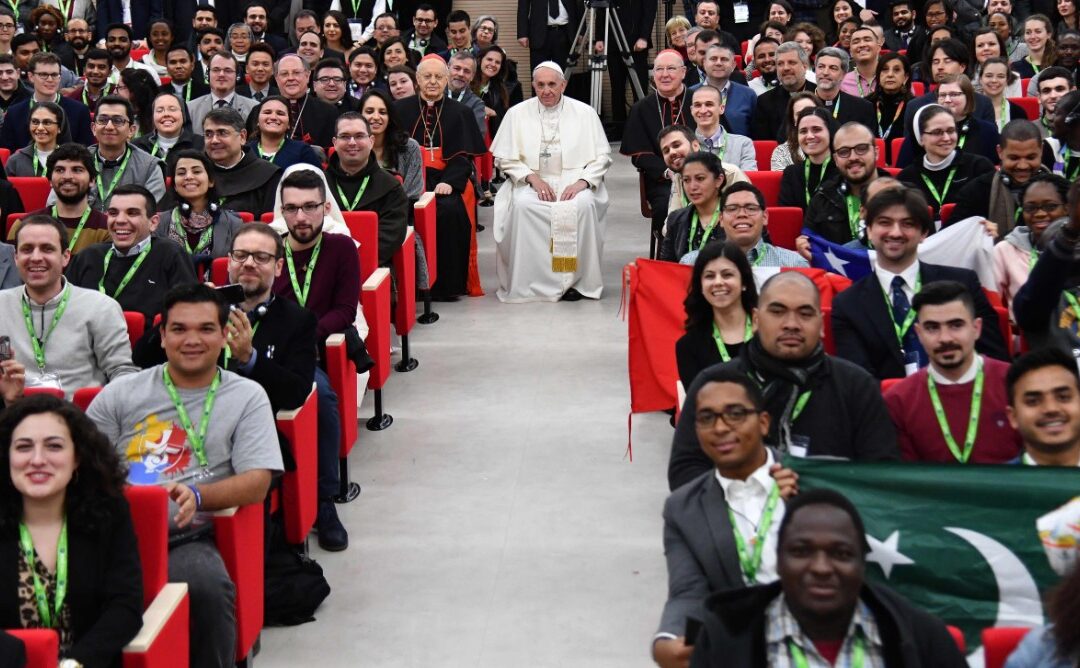
Mar 30, 2018 | Non categorizzato
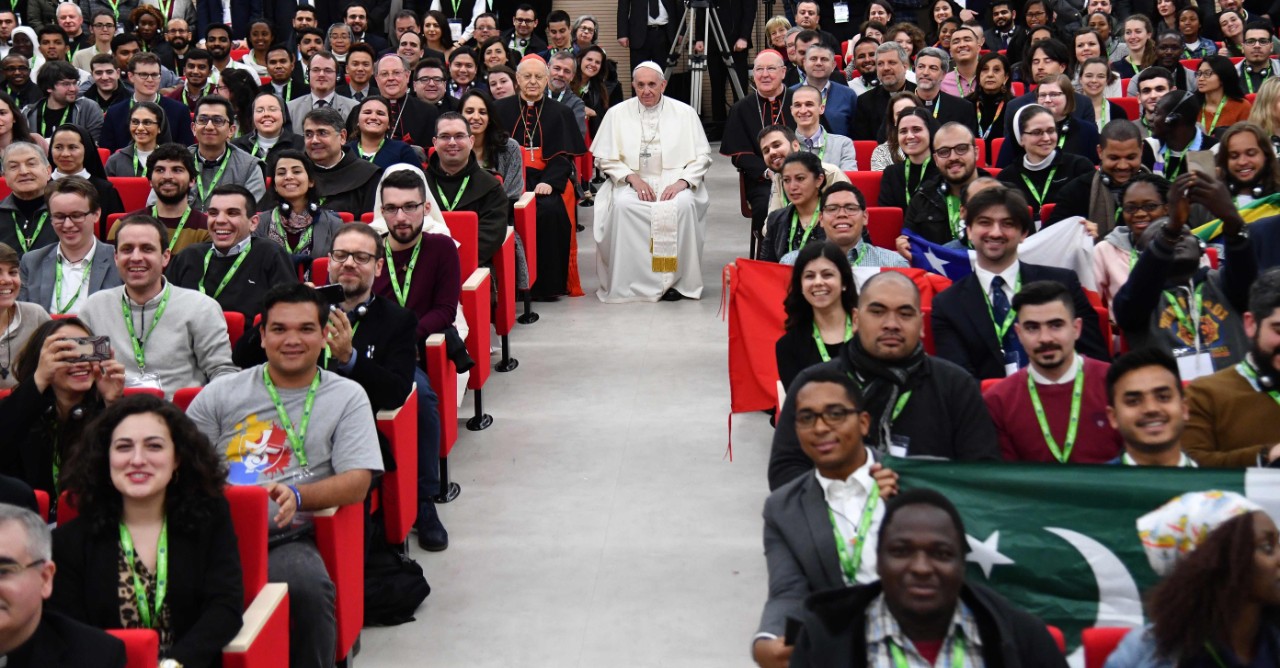 Young people want to find “peace, love, trust, equality, freedom and justice” in the Church. They also search for security, the capacity to listen, consideration, readiness to welcome the contribution of others. These are young people from every corner of the globe, belonging to different faiths, having different beliefs, coming from different social, economic and cultural backgrounds. Even young people who “do not follow traditional religions or say they are religious” but who are “open to spirituality” and want to work for others and for the common good are looking for a guide to provide direction and meaning in life. The young people themselves shared these ideas at a meeting that took place in Rome from March 19th -24th: this meeting was a preparation for the XV Ordinary Synod of Bishops on “Young people, the faith and vocational discernment” that will take place in October 2018. It was Pope Francis himself who wanted this Synod. The 300 young people present for the preparatory meeting and another 15 thousand linked up by web told the Church – gathered to listen in this way for the first time ever – all about their hopes and challenges and what they would like to find in those who are God’s ministers. They also spoke of what they are looking for in society as a whole. They shared their experiences and offered their suggestions to help ensure that the message of the gospel reaches an increasing number of young people, that it is expressed in the right way and with an attitude that is humble and open to dialogue. At the invitation of Pope Francis who asked the young people to speak openly and to be “cheeky” enough to ask difficult questions, they said very clearly that they wanted “attractive role models who are genuine and who do what they say”, “real witnesses who speak the gospel with their lives”, “men and women who can speak with passion about their faith and their relationship with Jesus and encourage others to draw close to him.” They want the Church to be welcoming, merciful, humble, human, inclusive, coherent, believable, “able to empathise with all the young people in the world” and show “tenderness” towards people to “don’t believe in following certain standards.” They are looking for “rational, critical responses to complex questions” such as sexuality, “addiction, marital and family breakdown” and to “the big social problems such as organised crime, human trafficking, violence, corruption, exploitation, murder of women and destruction of the natural environment.” They admit to not having a single, unified vision about complex issues such as migration and welcoming refugees even though there is “a universal duty to care for the dignity of every human being.” They also feel that there is little agreement among young people – neither within the Church nor in the broader world – about controversial issues such as “contraception, abortion, homosexuality, living together, marriage and even how the priesthood is understood.” Nonetheless, even the young people who do not share in the Church’s teaching still “want to be part of it.” Furthermore, they are shocked by the current “political, social and economic instability” and ask the Church to be “solid and with a preference for those who are struggling on the margins of society.” They want a sure guide because “simple answers are not enough.” They also expect the Church to acknowledge the mistakes it has made, all that it has failed to do and even its most painful wounds. This is the only way they can believe and trust the Church. Young people ask to be more involved in decision making, to be given responsibility and leadership roles in a broader context such as parish groups. They also feel that women should be involved more, that there should be more possibility for them to use their talents. They want the Church to be present and to search for them in the social and virtual worlds that they inhabit – in the bar, on the sports field and in social media. They also want to know more about the sacraments and to attend both large-scale events such as the World Youth Day as well as small ones in the diocese and parish. They want to be included, to be part of a group – “even a small local group where we can ask questions and share our Christian life is so important in nurturing and preserving our faith.” In conclusion, they are young people looking for their vocation in the world and for the meaning of life. They care for and cultivate their own spirituality – and almost always – see the Church as a great partner. Now it is up to the Church, as it has said itself, to take notice of what they are saying. The next appointment is in October at the Synod Assembly but, in the meantime, the Pope has said, “You will be taken seriously.”
Young people want to find “peace, love, trust, equality, freedom and justice” in the Church. They also search for security, the capacity to listen, consideration, readiness to welcome the contribution of others. These are young people from every corner of the globe, belonging to different faiths, having different beliefs, coming from different social, economic and cultural backgrounds. Even young people who “do not follow traditional religions or say they are religious” but who are “open to spirituality” and want to work for others and for the common good are looking for a guide to provide direction and meaning in life. The young people themselves shared these ideas at a meeting that took place in Rome from March 19th -24th: this meeting was a preparation for the XV Ordinary Synod of Bishops on “Young people, the faith and vocational discernment” that will take place in October 2018. It was Pope Francis himself who wanted this Synod. The 300 young people present for the preparatory meeting and another 15 thousand linked up by web told the Church – gathered to listen in this way for the first time ever – all about their hopes and challenges and what they would like to find in those who are God’s ministers. They also spoke of what they are looking for in society as a whole. They shared their experiences and offered their suggestions to help ensure that the message of the gospel reaches an increasing number of young people, that it is expressed in the right way and with an attitude that is humble and open to dialogue. At the invitation of Pope Francis who asked the young people to speak openly and to be “cheeky” enough to ask difficult questions, they said very clearly that they wanted “attractive role models who are genuine and who do what they say”, “real witnesses who speak the gospel with their lives”, “men and women who can speak with passion about their faith and their relationship with Jesus and encourage others to draw close to him.” They want the Church to be welcoming, merciful, humble, human, inclusive, coherent, believable, “able to empathise with all the young people in the world” and show “tenderness” towards people to “don’t believe in following certain standards.” They are looking for “rational, critical responses to complex questions” such as sexuality, “addiction, marital and family breakdown” and to “the big social problems such as organised crime, human trafficking, violence, corruption, exploitation, murder of women and destruction of the natural environment.” They admit to not having a single, unified vision about complex issues such as migration and welcoming refugees even though there is “a universal duty to care for the dignity of every human being.” They also feel that there is little agreement among young people – neither within the Church nor in the broader world – about controversial issues such as “contraception, abortion, homosexuality, living together, marriage and even how the priesthood is understood.” Nonetheless, even the young people who do not share in the Church’s teaching still “want to be part of it.” Furthermore, they are shocked by the current “political, social and economic instability” and ask the Church to be “solid and with a preference for those who are struggling on the margins of society.” They want a sure guide because “simple answers are not enough.” They also expect the Church to acknowledge the mistakes it has made, all that it has failed to do and even its most painful wounds. This is the only way they can believe and trust the Church. Young people ask to be more involved in decision making, to be given responsibility and leadership roles in a broader context such as parish groups. They also feel that women should be involved more, that there should be more possibility for them to use their talents. They want the Church to be present and to search for them in the social and virtual worlds that they inhabit – in the bar, on the sports field and in social media. They also want to know more about the sacraments and to attend both large-scale events such as the World Youth Day as well as small ones in the diocese and parish. They want to be included, to be part of a group – “even a small local group where we can ask questions and share our Christian life is so important in nurturing and preserving our faith.” In conclusion, they are young people looking for their vocation in the world and for the meaning of life. They care for and cultivate their own spirituality – and almost always – see the Church as a great partner. Now it is up to the Church, as it has said itself, to take notice of what they are saying. The next appointment is in October at the Synod Assembly but, in the meantime, the Pope has said, “You will be taken seriously.”
Claudia Di Lorenzi
Document
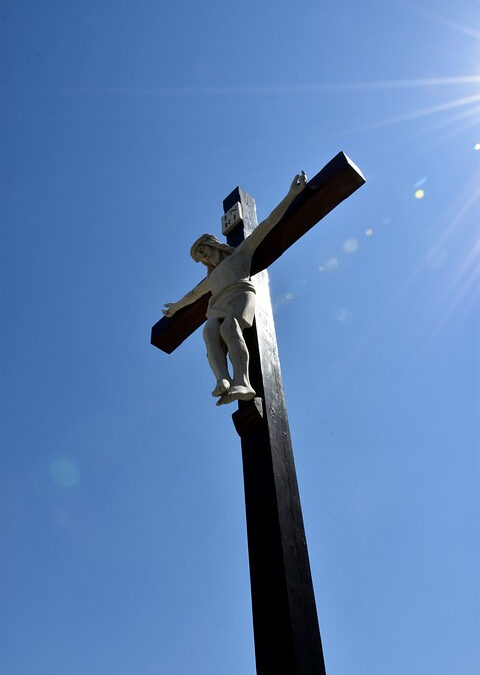
Mar 29, 2018 | Non categorizzato
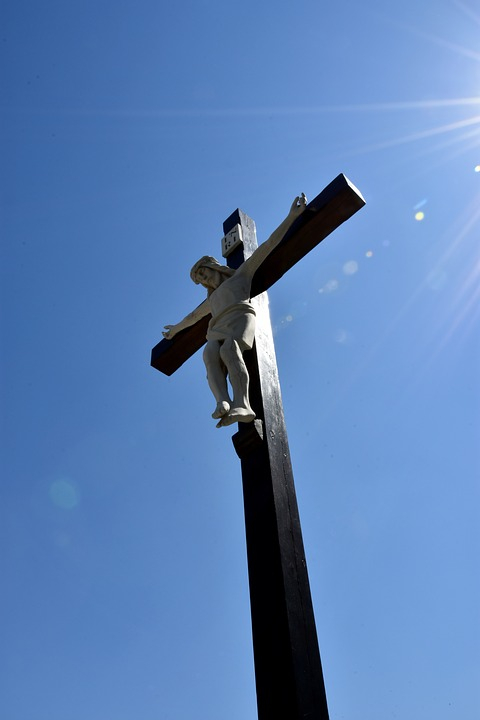 “I’ve recently written a book about him called “The Cry”. I dedicated it to him with the intention of writing it also on your behalf, on behalf of the whole Movement “as – and this is the dedication – a love letter to Jesus forsaken”. In it, I speak of him who, in the one life given to us by God, one day, a particular day that was different for each of us, called us to follow him and give ourselves to him. It’s clear then – and I say this in the book – that what I want to say in those pages cannot be considered as a talk, albeit one that is personal, familiar in tone and deeply felt. Instead it wants to be a song, a hymn of joy and especially of gratitude to him. “He had given everything: the life he lived with Mary, in obedience and in the difficulties of daily life. He had given three years of preaching and three hours on the cross, from which he forgave his executioners, promised Paradise to the good thief, and gave his Mother to us. Only his divinity remained. “His union with the Father, his sweet and ineffable union with God, had made him powerful on earth as the Son of God and majestic on the cross. Yet there, the awareness of God’s presence had to sink into the deepest recesses of his soul so as not to be felt any longer. It had to separate him in some way from the One with whom he had said he was one”, and make him cry out: “My God, my God, why have you forsaken me?” (Mt. 27:46).″ Source: Chiara Lubich during a telephone link up. Castel Gandolfo, Rome, 20th April 2000.
“I’ve recently written a book about him called “The Cry”. I dedicated it to him with the intention of writing it also on your behalf, on behalf of the whole Movement “as – and this is the dedication – a love letter to Jesus forsaken”. In it, I speak of him who, in the one life given to us by God, one day, a particular day that was different for each of us, called us to follow him and give ourselves to him. It’s clear then – and I say this in the book – that what I want to say in those pages cannot be considered as a talk, albeit one that is personal, familiar in tone and deeply felt. Instead it wants to be a song, a hymn of joy and especially of gratitude to him. “He had given everything: the life he lived with Mary, in obedience and in the difficulties of daily life. He had given three years of preaching and three hours on the cross, from which he forgave his executioners, promised Paradise to the good thief, and gave his Mother to us. Only his divinity remained. “His union with the Father, his sweet and ineffable union with God, had made him powerful on earth as the Son of God and majestic on the cross. Yet there, the awareness of God’s presence had to sink into the deepest recesses of his soul so as not to be felt any longer. It had to separate him in some way from the One with whom he had said he was one”, and make him cry out: “My God, my God, why have you forsaken me?” (Mt. 27:46).″ Source: Chiara Lubich during a telephone link up. Castel Gandolfo, Rome, 20th April 2000.
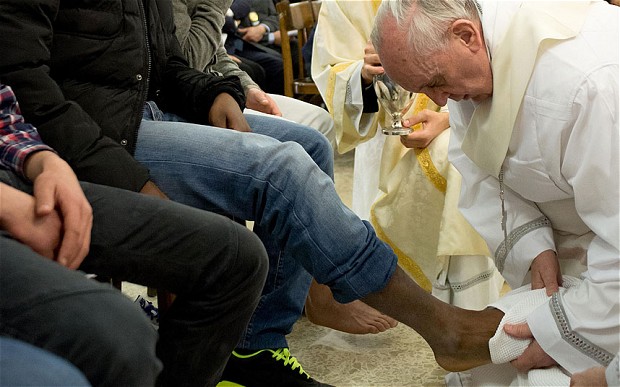
Mar 28, 2018 | Non categorizzato
 Today, then, the word is Love. Holy Thursday is the day on which, over the years, we have often experienced the sweetness of a special union with God. It reminds us of the abundance of love that heaven poured out over the earth. This Love, first of all, is in the Eucharist given to us on this day. This Love is in the priesthood, which is a service of love and enables us to have the Eucharist. This Love is in unity, which is the effect of love and for which Jesus implored the Father: “That they may all be one, as you … and I” (cf. Jn. 17:21). This Love is in the new commandment which he revealed on this day before dying. “Just as I have loved you, you also should love one another. By this everyone will know that you are my disciples, if you have love for one another (Jn. 13:34-35). This commandment enables our life here on earth to be modelled on that of the Holy Trinity. Source: Chiara Lubich during a telephone link up. Castel Gandolfo, Romea, 20th April 2000.
Today, then, the word is Love. Holy Thursday is the day on which, over the years, we have often experienced the sweetness of a special union with God. It reminds us of the abundance of love that heaven poured out over the earth. This Love, first of all, is in the Eucharist given to us on this day. This Love is in the priesthood, which is a service of love and enables us to have the Eucharist. This Love is in unity, which is the effect of love and for which Jesus implored the Father: “That they may all be one, as you … and I” (cf. Jn. 17:21). This Love is in the new commandment which he revealed on this day before dying. “Just as I have loved you, you also should love one another. By this everyone will know that you are my disciples, if you have love for one another (Jn. 13:34-35). This commandment enables our life here on earth to be modelled on that of the Holy Trinity. Source: Chiara Lubich during a telephone link up. Castel Gandolfo, Romea, 20th April 2000.
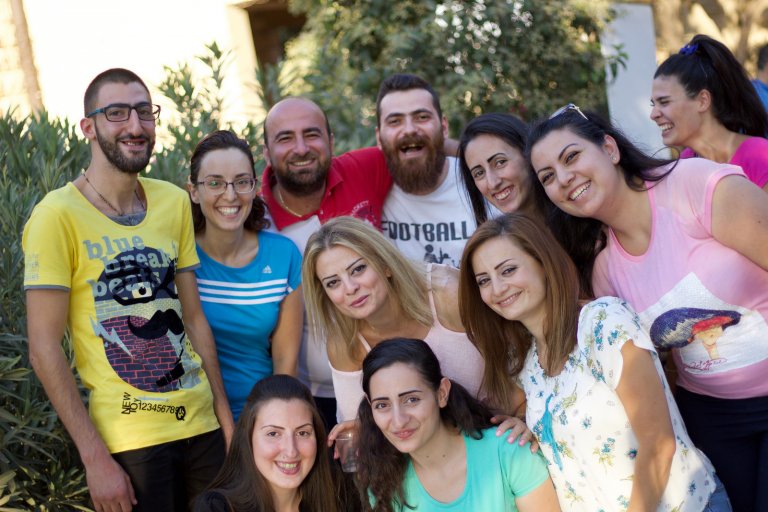
Mar 28, 2018 | Non categorizzato
 “September flew by. I had taken a taxi with some other people who resided in the town. We we were leaving the city that had welcomed me: Aleppo. I was among the few – perhaps the only – foreigner that had chosen this place for vacation. The taxi crossed the city, an expanse of neighbourhoods completely destroyed. How many dead were buried beneath those ruins? The driver didn’t seem to think about that as he sped along the street that led south in the direction of Homs. From there he would proceed in the direction of Beirut. After two and a half hours we were able to make out the first houses that was left standing. It was difficult to believe. I was welcomed for a month by the Focolare community. When I arrived at the door of a church, someone said to me: ‘Here you will find real Christians,’ words I had never heard spoken before. But now I understand. I saw for myself how the focolare is the place in which everything is shared: the Providence that comes from around the world, with tables full of clothes, and so forth; but mostly the joys and sorrows of daily life… Here, for years, the only support was the Word of the Gospel, the God of love. How the beginnings of the Focolare history returned to my mind, when Chiara Lubich would describe them saying those words that I heard so many times: ‘It was war time and everything crumbled!’
“September flew by. I had taken a taxi with some other people who resided in the town. We we were leaving the city that had welcomed me: Aleppo. I was among the few – perhaps the only – foreigner that had chosen this place for vacation. The taxi crossed the city, an expanse of neighbourhoods completely destroyed. How many dead were buried beneath those ruins? The driver didn’t seem to think about that as he sped along the street that led south in the direction of Homs. From there he would proceed in the direction of Beirut. After two and a half hours we were able to make out the first houses that was left standing. It was difficult to believe. I was welcomed for a month by the Focolare community. When I arrived at the door of a church, someone said to me: ‘Here you will find real Christians,’ words I had never heard spoken before. But now I understand. I saw for myself how the focolare is the place in which everything is shared: the Providence that comes from around the world, with tables full of clothes, and so forth; but mostly the joys and sorrows of daily life… Here, for years, the only support was the Word of the Gospel, the God of love. How the beginnings of the Focolare history returned to my mind, when Chiara Lubich would describe them saying those words that I heard so many times: ‘It was war time and everything crumbled!’
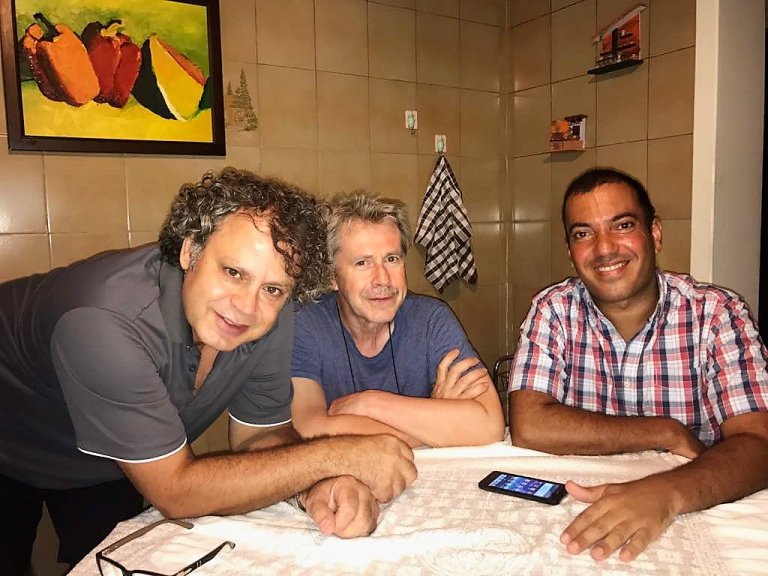
Bernard (centre), with Freddy (left) and Murad (right) in the Focolare centre of Aleppo.
 The price paid by the population during the war was high, too high: many, many dead, then the diseases, depression, trauma, isolation, lack of education and instruction, work training and all the abandoned children… the list would be too long. I always posed a question to the local people: ‘What do you think is important in facing the future?’ I thought the answer would be ‘rebuilding our houses and resuming productive activities.’ But instead, to my great surprise, the answer I heard most was ‘a great spiritual strength, capable of making new life to be born even here.’ Thank you Robert, Pascal, Freddy and Murad. Thank you Ghada, Lina Chris, Maria Grazia, Maria and Zeina for your life and witness. Now you have a special place in my heart.” Compiled by Gustavo Clariá
The price paid by the population during the war was high, too high: many, many dead, then the diseases, depression, trauma, isolation, lack of education and instruction, work training and all the abandoned children… the list would be too long. I always posed a question to the local people: ‘What do you think is important in facing the future?’ I thought the answer would be ‘rebuilding our houses and resuming productive activities.’ But instead, to my great surprise, the answer I heard most was ‘a great spiritual strength, capable of making new life to be born even here.’ Thank you Robert, Pascal, Freddy and Murad. Thank you Ghada, Lina Chris, Maria Grazia, Maria and Zeina for your life and witness. Now you have a special place in my heart.” Compiled by Gustavo Clariá
Mar 27, 2018 | Non categorizzato, Word of
for ages 4-8 | for ages 9-17 | Print | Audio
These words are part of a long dialogue Jesus had with the crowd around him. They had seen the sign that he had performed in the multiplication of the loaves and followed him, perhaps just wanting more material help. Starting from their immediate needs, Jesus gradually brings the conversation around to his mission: he was sent by the Father to give humanity true life, eternal life, which is the life of God himself, who is Love. As Jesus walked along the roads of Palestine, he took an interest in all the people he met, not shying away from their requests for food, water, healing and forgiveness. On the contrary, he met all their needs and gave hope to everyone. That is why he could then ask all who heard him to take a further step, to accept the life he offered, to be in relationship with him, trust him and believe in him. Commenting on this sentence of the Gospel, Chiara Lubich wrote in the magazine Città Nuova in 1991: “Here, Jesus responds to people’s deepest aspirations. They have been created for life and seek life with all their strength. But their great mistake is to look for it in other people and in things that, being limited and passing, cannot give a genuine answer to their aspirations … Only Jesus can satisfy their hunger. Only he can give life without end, for he is the Life.” “Very truly, I tell you, whoever believes has eternal life.” Christian faith is primarily the fruit of a personal encounter with God, with Jesus, who wants nothing more than to have us share in his very own life. Faith in Jesus means following his example of not being wrapped up in ourselves, in our fears and limited plans, but rather to focus our attention on the needs of others. They may have real needs arising from poverty, illness and marginalization, and above all they need to be listened to, accepted and welcomed. In this way, through the life we are living, we will be able to share the love we have received as a gift from God with others. To strengthen us on our journey, he has also left us the great gift of the Eucharist, a sign of a self-giving love that enables others to live. “Very truly, I tell you, whoever believes has eternal life.” Often, during the day, we place our trust in people around us. It may be the teacher who teaches our children, the taxi driver who takes us to our destination, the doctor who treats us … We cannot live without trust, and trust is increased by knowing one another, through friendship, by a relationship deepened over time. How then can we live the Word of Life this month? Continuing her commentary, Chiara invited us to renew our complete choice of Jesus: “We already know how to do this by putting his words into practice with fresh commitment. His words remind us of many specific aspects of life. For example, are we meeting a neighbor? ‘You shall love your neighbor as yourself’ (Mt 22:39). Are we suffering? ‘If any want to become my follower … then they should take up their cross’ (Mt 16:24), and so on. “If we do so, the words of Jesus will be a source of light, and he will come to us with his truth, his strength and his love. Our life will become more and more life with him, doing everything with him. We will no longer be afraid even of the physical death that awaits us all, because with Jesus true life has already begun in us, the life that never ends.” Letizia Magri
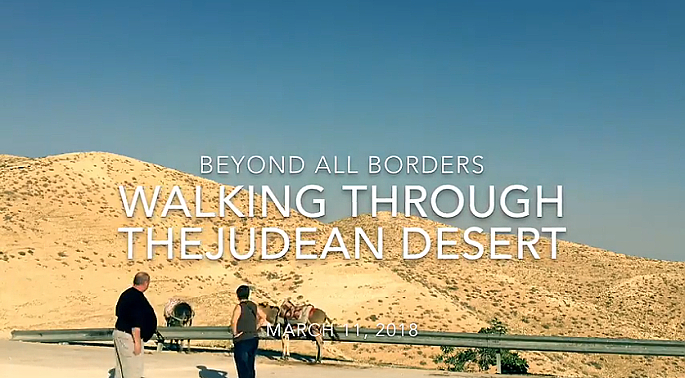
Mar 26, 2018 | Focolare Worldwide

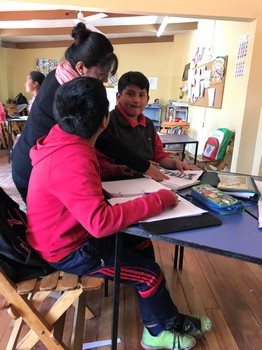
Mar 25, 2018 | Focolare Worldwide
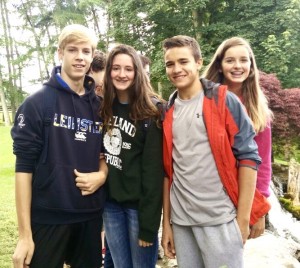 Green and friendly Ireland is full of excellent schools for students of all ages to learn English. Language Learning International (LLI) is no exception. Various kinds of study vacations are available with cutting edge learning techniques, family programs, culture, sport and entertainment, along with internships in France and Spain for Irish students. What distinguishes the educational approach of this school, which was founded in 1989 by Eugene Murphy in Dublin, is the quality of the relationships with the students in a welcoming atmosphere and a sensitive look towards the personal characteristics of each individual. But there is something else. The LLI, with its over 2 thousand students every year, is a representative of the Economy of Communion (EoC) in the training sector. The following experiences were drawn from the EoC website. “A boy showed up at summer camp with Asperger Syndrome, which we didn’t know anything about until he arrived. The first lodgings were not very appropriate for him, because they weren’t able to meet the particular needs of the youngster. They tried moving him to another family, but the difficulties began again. Even though the summer is a very intense season, in the business we want to be sure to ensure just and serene treatment for anyone comes, so we looked for another alternative until we were able to find an elderly woman who was happy to host the boy, being very familiar herself with the syndrome that her grandson also suffered from. Everything turned out positive for everyone: The student was able to take full advantage of the experience and return home happy in the evening. And the person in charge of relations with the family declared that the presence of the boy in the program had filled the entire season with value!” “Great atmosphere at the English course, in the classroom and excellent relationships established; one of the tests to be prepared, however, was an individual oral presentation. Suddenly a 15-year-old boy approached Eugene Murphy, the school’s founder and expert trainer. He told her that he would be unable to do it because of his stuttering. Eugene talked to other trainers and they decide to reassure the boy by doing the test privately. In the end, the teachers encouraged him to share the experience with others anyway, the young man agreed and, between his own emotion and the general emotion, the test concluded with a long applause from the class. It was then discovered that the boy had not spoken until the age of 7 and that performance in public turned out to be a sort of miracle that made him and his parents incredibly joyful”.
Green and friendly Ireland is full of excellent schools for students of all ages to learn English. Language Learning International (LLI) is no exception. Various kinds of study vacations are available with cutting edge learning techniques, family programs, culture, sport and entertainment, along with internships in France and Spain for Irish students. What distinguishes the educational approach of this school, which was founded in 1989 by Eugene Murphy in Dublin, is the quality of the relationships with the students in a welcoming atmosphere and a sensitive look towards the personal characteristics of each individual. But there is something else. The LLI, with its over 2 thousand students every year, is a representative of the Economy of Communion (EoC) in the training sector. The following experiences were drawn from the EoC website. “A boy showed up at summer camp with Asperger Syndrome, which we didn’t know anything about until he arrived. The first lodgings were not very appropriate for him, because they weren’t able to meet the particular needs of the youngster. They tried moving him to another family, but the difficulties began again. Even though the summer is a very intense season, in the business we want to be sure to ensure just and serene treatment for anyone comes, so we looked for another alternative until we were able to find an elderly woman who was happy to host the boy, being very familiar herself with the syndrome that her grandson also suffered from. Everything turned out positive for everyone: The student was able to take full advantage of the experience and return home happy in the evening. And the person in charge of relations with the family declared that the presence of the boy in the program had filled the entire season with value!” “Great atmosphere at the English course, in the classroom and excellent relationships established; one of the tests to be prepared, however, was an individual oral presentation. Suddenly a 15-year-old boy approached Eugene Murphy, the school’s founder and expert trainer. He told her that he would be unable to do it because of his stuttering. Eugene talked to other trainers and they decide to reassure the boy by doing the test privately. In the end, the teachers encouraged him to share the experience with others anyway, the young man agreed and, between his own emotion and the general emotion, the test concluded with a long applause from the class. It was then discovered that the boy had not spoken until the age of 7 and that performance in public turned out to be a sort of miracle that made him and his parents incredibly joyful”.  LLI Director, Cathy Young, tells about a new project that has involved the school in an adventure of openness with a geographic region that is quite far from Ireland: “We wanted to undertake a Economy of Communion project that focused on education. On the United World Association website, we learned of a fantastic project in Bolivia, called Fondazione Unisol, which offers support to several of the poorest families in Cochabamba. We made contact and have put together a project that will finance the purchase of new books and portable computers, furnish new desks and chairs for classrooms, and support the work of two teachers”. “This reciprocal exchange,” says Cathy, “is one of the most beautiful aspects of our collaboration, and it helps us to live better in our daily work environment.” At LLI the students have a live learning experience of the meaning of many words, but the first is sharing. Chiara Favotti
LLI Director, Cathy Young, tells about a new project that has involved the school in an adventure of openness with a geographic region that is quite far from Ireland: “We wanted to undertake a Economy of Communion project that focused on education. On the United World Association website, we learned of a fantastic project in Bolivia, called Fondazione Unisol, which offers support to several of the poorest families in Cochabamba. We made contact and have put together a project that will finance the purchase of new books and portable computers, furnish new desks and chairs for classrooms, and support the work of two teachers”. “This reciprocal exchange,” says Cathy, “is one of the most beautiful aspects of our collaboration, and it helps us to live better in our daily work environment.” At LLI the students have a live learning experience of the meaning of many words, but the first is sharing. Chiara Favotti
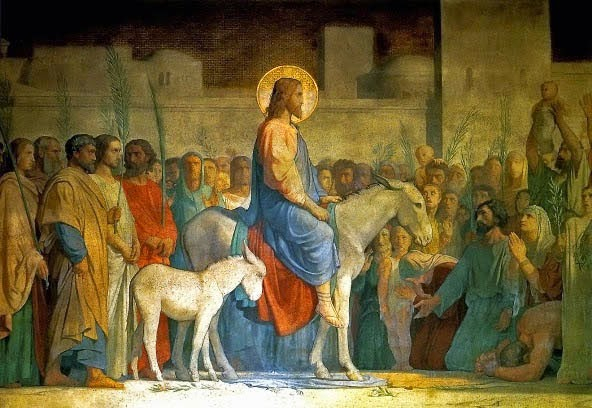
Mar 24, 2018 | Non categorizzato
 “In you, O Lord, I take refuge, I will never be put to shame” (Ps 71:1). This is how the already seriously ill bishop, Klaus Hemmerle, began his last homily at the Dome Church of Aachen, Germany. It was late 1993. “God, you hold me with your strength just as I am. God, you hold the world just as it is. God, you hold this neighbor with your strength just as he is.” To be held up by this God who descended in the kenosis, who stripped himself of everything and took on the form of a slave – this is the only way that the door of hope can be reopened in us: welcoming Him who first welcomed us, letting ourselves be carried by Him. Believing that we are held up by Him: This is the eye of the needle through which we receive the thread of hope that is slipped through it. This God can truly give us hope. This is where our Church with all its errors and weaknesses, with all its requests and its too large and too small challenges, can be something extraordinary: a community of people that believe in the fact that they have been welcomed and supported, a community of people that support one another, in which each one holds up the other.” From “Klaus Hemmerle, innamorato della Parola di Dio” – Città Nuova Ed, 290-291.
“In you, O Lord, I take refuge, I will never be put to shame” (Ps 71:1). This is how the already seriously ill bishop, Klaus Hemmerle, began his last homily at the Dome Church of Aachen, Germany. It was late 1993. “God, you hold me with your strength just as I am. God, you hold the world just as it is. God, you hold this neighbor with your strength just as he is.” To be held up by this God who descended in the kenosis, who stripped himself of everything and took on the form of a slave – this is the only way that the door of hope can be reopened in us: welcoming Him who first welcomed us, letting ourselves be carried by Him. Believing that we are held up by Him: This is the eye of the needle through which we receive the thread of hope that is slipped through it. This God can truly give us hope. This is where our Church with all its errors and weaknesses, with all its requests and its too large and too small challenges, can be something extraordinary: a community of people that believe in the fact that they have been welcomed and supported, a community of people that support one another, in which each one holds up the other.” From “Klaus Hemmerle, innamorato della Parola di Dio” – Città Nuova Ed, 290-291.
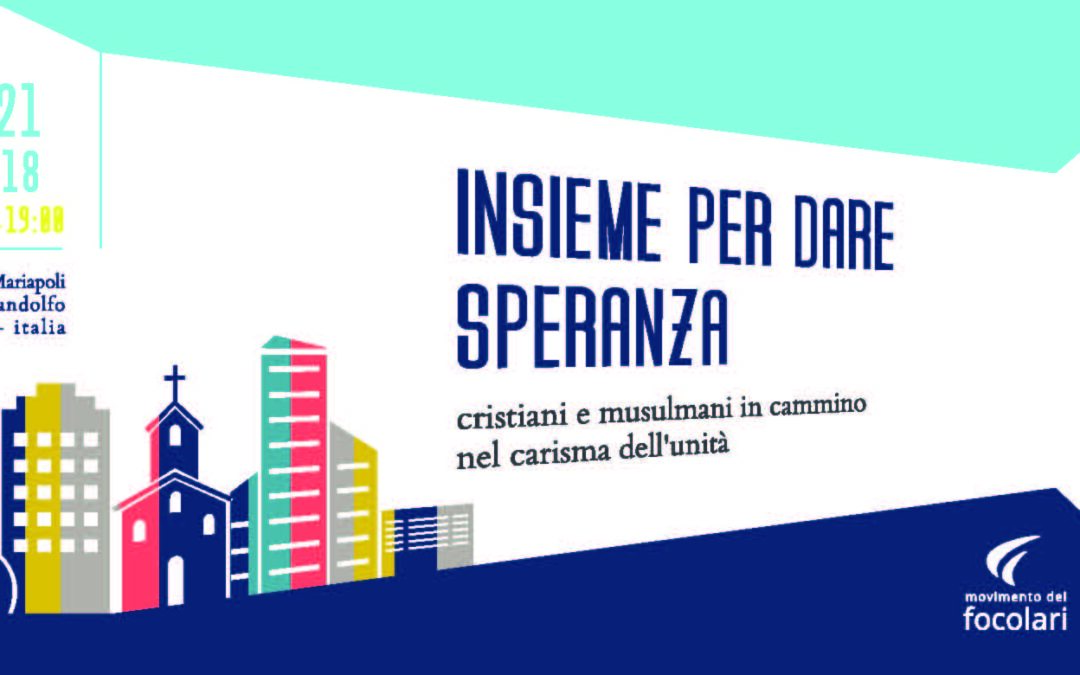
Mar 23, 2018 | Non categorizzato
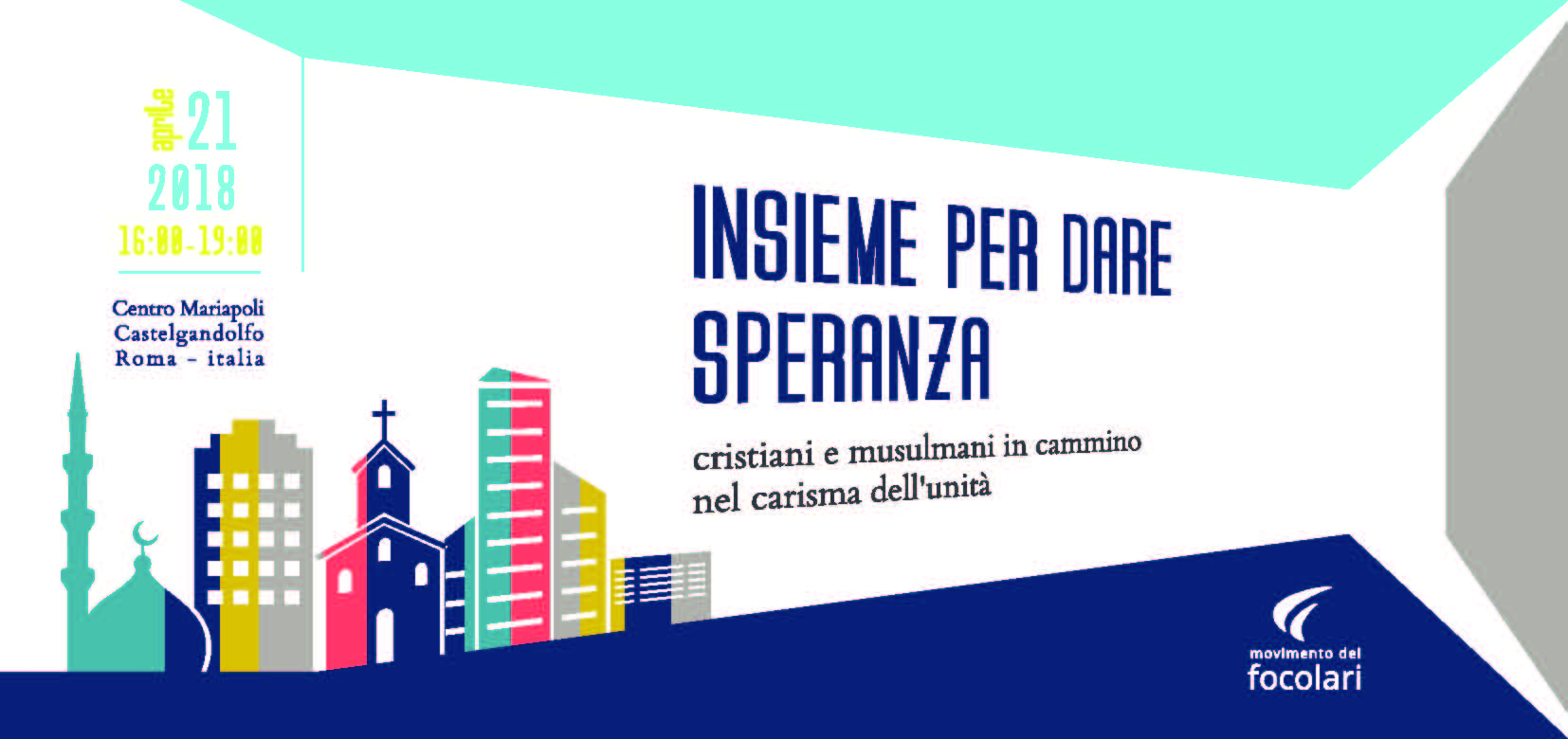 Christians and Muslims on the march, in the charism of unity “What is impossible to thousands of isolated and divided individuals, seems to become possible for people who have made mutual love, mutual understanding and unity the essential motive of their life.” (Chiara Lubich to a group of Muslims, December 7, 2002 in Madrid, Spain) Promoted by the Focolare Movement’s Centre for Interreligious Dialogue, an open gathering will be held on the afternoon of April 21, 2018, from 16:00 until 19:00. The event will take place within the context of some days of sharing between Muslims and Christians which has grown into very solid dialogue and fraternity. Reflections and experiences will be offered from around the world that began and developed within the light of Chiara Lubich’s charism of unity. The common hope is to offer some glimpses of hope inside the complex and often painful situations today’s world is going through. The event will take place at the Mariapolis Centre of Castelgandolfo, Italy. For information: congressoaprile18@focolare.org
Christians and Muslims on the march, in the charism of unity “What is impossible to thousands of isolated and divided individuals, seems to become possible for people who have made mutual love, mutual understanding and unity the essential motive of their life.” (Chiara Lubich to a group of Muslims, December 7, 2002 in Madrid, Spain) Promoted by the Focolare Movement’s Centre for Interreligious Dialogue, an open gathering will be held on the afternoon of April 21, 2018, from 16:00 until 19:00. The event will take place within the context of some days of sharing between Muslims and Christians which has grown into very solid dialogue and fraternity. Reflections and experiences will be offered from around the world that began and developed within the light of Chiara Lubich’s charism of unity. The common hope is to offer some glimpses of hope inside the complex and often painful situations today’s world is going through. The event will take place at the Mariapolis Centre of Castelgandolfo, Italy. For information: congressoaprile18@focolare.org
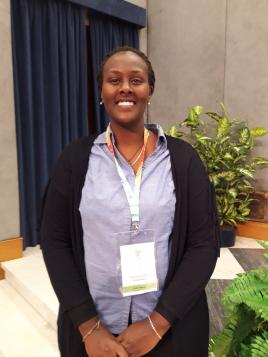
Mar 23, 2018 | Non categorizzato
 “I saw in the Pope, enthusiasm in listening. He asked us to speak up with courage, with no filters, freely, and this is what we do. The Church is at our disposal, and we are certain that the Synod in October will bear many fruits.” Stella Nishimwe comes from Burundi, is a member of the Focolare Movement, and represents her country in the pre-Synodal assembly. “I was struck by what Pope Francis said yesterday. He’s a special person who lives with the people of God and really knows the reality of the world. Together with the population he wishes to seek solutions, starting from the aspects of life. From the Synod, I expect a new path of the Church with the youth will arise, where the young people will feel the common responsibility in the progress of the Church.” Nishimwe then spoke of the conditions of the young people in her country: “They live in poverty, in the uncertainty of the future, with an elevated unemployment. With this Synod I see a Church that listens, walks with us, shares the difficulties which the youth undergo in different countries, under contexts of war, poverty and unemployment. These situations will be difficult to change, but at least we can try together and in so doing experience what it means to be a Church, a sole family.” Fonte: SIR https://www.agensir.it/quotidiano/2018/3/20/pre-sinodo-giovani-nishimwe-burundi-ho-visto-nel-papa-lentusiasmo-dellascolto/
“I saw in the Pope, enthusiasm in listening. He asked us to speak up with courage, with no filters, freely, and this is what we do. The Church is at our disposal, and we are certain that the Synod in October will bear many fruits.” Stella Nishimwe comes from Burundi, is a member of the Focolare Movement, and represents her country in the pre-Synodal assembly. “I was struck by what Pope Francis said yesterday. He’s a special person who lives with the people of God and really knows the reality of the world. Together with the population he wishes to seek solutions, starting from the aspects of life. From the Synod, I expect a new path of the Church with the youth will arise, where the young people will feel the common responsibility in the progress of the Church.” Nishimwe then spoke of the conditions of the young people in her country: “They live in poverty, in the uncertainty of the future, with an elevated unemployment. With this Synod I see a Church that listens, walks with us, shares the difficulties which the youth undergo in different countries, under contexts of war, poverty and unemployment. These situations will be difficult to change, but at least we can try together and in so doing experience what it means to be a Church, a sole family.” Fonte: SIR https://www.agensir.it/quotidiano/2018/3/20/pre-sinodo-giovani-nishimwe-burundi-ho-visto-nel-papa-lentusiasmo-dellascolto/

 Young people want to find “peace, love, trust, equality, freedom and justice” in the Church. They also search for security, the capacity to listen, consideration, readiness to welcome the contribution of others. These are young people from every corner of the globe, belonging to different faiths, having different beliefs, coming from different social, economic and cultural backgrounds. Even young people who “do not follow traditional religions or say they are religious” but who are “open to spirituality” and want to work for others and for the common good are looking for a guide to provide direction and meaning in life. The young people themselves shared these ideas at a meeting that took place in Rome from March 19th -24th: this meeting was a preparation for the XV Ordinary Synod of Bishops on “Young people, the faith and vocational discernment” that will take place in October 2018. It was Pope Francis himself who wanted this Synod. The 300 young people present for the preparatory meeting and another 15 thousand linked up by web told the Church – gathered to listen in this way for the first time ever – all about their hopes and challenges and what they would like to find in those who are God’s ministers. They also spoke of what they are looking for in society as a whole. They shared their experiences and offered their suggestions to help ensure that the message of the gospel reaches an increasing number of young people, that it is expressed in the right way and with an attitude that is humble and open to dialogue. At the invitation of Pope Francis who asked the young people to speak openly and to be “cheeky” enough to ask difficult questions, they said very clearly that they wanted “attractive role models who are genuine and who do what they say”, “real witnesses who speak the gospel with their lives”, “men and women who can speak with passion about their faith and their relationship with Jesus and encourage others to draw close to him.” They want the Church to be welcoming, merciful, humble, human, inclusive, coherent, believable, “able to empathise with all the young people in the world” and show “tenderness” towards people to “don’t believe in following certain standards.” They are looking for “rational, critical responses to complex questions” such as sexuality, “addiction, marital and family breakdown” and to “the big social problems such as organised crime, human trafficking, violence, corruption, exploitation, murder of women and destruction of the natural environment.” They admit to not having a single, unified vision about complex issues such as migration and welcoming refugees even though there is “a universal duty to care for the dignity of every human being.” They also feel that there is little agreement among young people – neither within the Church nor in the broader world – about controversial issues such as “contraception, abortion, homosexuality, living together, marriage and even how the priesthood is understood.” Nonetheless, even the young people who do not share in the Church’s teaching still “want to be part of it.” Furthermore, they are shocked by the current “political, social and economic instability” and ask the Church to be “solid and with a preference for those who are struggling on the margins of society.” They want a sure guide because “simple answers are not enough.” They also expect the Church to acknowledge the mistakes it has made, all that it has failed to do and even its most painful wounds. This is the only way they can believe and trust the Church. Young people ask to be more involved in decision making, to be given responsibility and leadership roles in a broader context such as parish groups. They also feel that women should be involved more, that there should be more possibility for them to use their talents. They want the Church to be present and to search for them in the social and virtual worlds that they inhabit – in the bar, on the sports field and in social media. They also want to know more about the sacraments and to attend both large-scale events such as the World Youth Day as well as small ones in the diocese and parish. They want to be included, to be part of a group – “even a small local group where we can ask questions and share our Christian life is so important in nurturing and preserving our faith.” In conclusion, they are young people looking for their vocation in the world and for the meaning of life. They care for and cultivate their own spirituality – and almost always – see the Church as a great partner. Now it is up to the Church, as it has said itself, to take notice of what they are saying. The next appointment is in October at the Synod Assembly but, in the meantime, the Pope has said, “You will be taken seriously.”
Young people want to find “peace, love, trust, equality, freedom and justice” in the Church. They also search for security, the capacity to listen, consideration, readiness to welcome the contribution of others. These are young people from every corner of the globe, belonging to different faiths, having different beliefs, coming from different social, economic and cultural backgrounds. Even young people who “do not follow traditional religions or say they are religious” but who are “open to spirituality” and want to work for others and for the common good are looking for a guide to provide direction and meaning in life. The young people themselves shared these ideas at a meeting that took place in Rome from March 19th -24th: this meeting was a preparation for the XV Ordinary Synod of Bishops on “Young people, the faith and vocational discernment” that will take place in October 2018. It was Pope Francis himself who wanted this Synod. The 300 young people present for the preparatory meeting and another 15 thousand linked up by web told the Church – gathered to listen in this way for the first time ever – all about their hopes and challenges and what they would like to find in those who are God’s ministers. They also spoke of what they are looking for in society as a whole. They shared their experiences and offered their suggestions to help ensure that the message of the gospel reaches an increasing number of young people, that it is expressed in the right way and with an attitude that is humble and open to dialogue. At the invitation of Pope Francis who asked the young people to speak openly and to be “cheeky” enough to ask difficult questions, they said very clearly that they wanted “attractive role models who are genuine and who do what they say”, “real witnesses who speak the gospel with their lives”, “men and women who can speak with passion about their faith and their relationship with Jesus and encourage others to draw close to him.” They want the Church to be welcoming, merciful, humble, human, inclusive, coherent, believable, “able to empathise with all the young people in the world” and show “tenderness” towards people to “don’t believe in following certain standards.” They are looking for “rational, critical responses to complex questions” such as sexuality, “addiction, marital and family breakdown” and to “the big social problems such as organised crime, human trafficking, violence, corruption, exploitation, murder of women and destruction of the natural environment.” They admit to not having a single, unified vision about complex issues such as migration and welcoming refugees even though there is “a universal duty to care for the dignity of every human being.” They also feel that there is little agreement among young people – neither within the Church nor in the broader world – about controversial issues such as “contraception, abortion, homosexuality, living together, marriage and even how the priesthood is understood.” Nonetheless, even the young people who do not share in the Church’s teaching still “want to be part of it.” Furthermore, they are shocked by the current “political, social and economic instability” and ask the Church to be “solid and with a preference for those who are struggling on the margins of society.” They want a sure guide because “simple answers are not enough.” They also expect the Church to acknowledge the mistakes it has made, all that it has failed to do and even its most painful wounds. This is the only way they can believe and trust the Church. Young people ask to be more involved in decision making, to be given responsibility and leadership roles in a broader context such as parish groups. They also feel that women should be involved more, that there should be more possibility for them to use their talents. They want the Church to be present and to search for them in the social and virtual worlds that they inhabit – in the bar, on the sports field and in social media. They also want to know more about the sacraments and to attend both large-scale events such as the World Youth Day as well as small ones in the diocese and parish. They want to be included, to be part of a group – “even a small local group where we can ask questions and share our Christian life is so important in nurturing and preserving our faith.” In conclusion, they are young people looking for their vocation in the world and for the meaning of life. They care for and cultivate their own spirituality – and almost always – see the Church as a great partner. Now it is up to the Church, as it has said itself, to take notice of what they are saying. The next appointment is in October at the Synod Assembly but, in the meantime, the Pope has said, “You will be taken seriously.” 

 “I’ve recently written a book about him called “The Cry”. I dedicated it to him with the intention of writing it also on your behalf, on behalf of the whole Movement “as – and this is the dedication – a love letter to
“I’ve recently written a book about him called “The Cry”. I dedicated it to him with the intention of writing it also on your behalf, on behalf of the whole Movement “as – and this is the dedication – a love letter to 

 “September flew by. I had taken a taxi with some other people who resided in the town. We we were leaving the city that had welcomed me: Aleppo. I was among the few – perhaps the only – foreigner that had chosen this place for vacation. The taxi crossed the city, an expanse of neighbourhoods completely destroyed. How many dead were buried beneath those ruins? The driver didn’t seem to think about that as he sped along the street that led south in the direction of Homs. From there he would proceed in the direction of Beirut. After two and a half hours we were able to make out the first houses that was left standing. It was difficult to believe. I was welcomed for a month by the Focolare community. When I arrived at the door of a church, someone said to me: ‘Here you will find real Christians,’ words I had never heard spoken before. But now I understand. I saw for myself how the focolare is the place in which everything is shared: the Providence that comes from around the world, with tables full of clothes, and so forth; but mostly the joys and sorrows of daily life… Here, for years, the only support was the Word of the Gospel, the God of love. How the beginnings of the Focolare history returned to my mind, when Chiara Lubich would describe them saying those words that I heard so many times: ‘It was war time and everything crumbled!’
“September flew by. I had taken a taxi with some other people who resided in the town. We we were leaving the city that had welcomed me: Aleppo. I was among the few – perhaps the only – foreigner that had chosen this place for vacation. The taxi crossed the city, an expanse of neighbourhoods completely destroyed. How many dead were buried beneath those ruins? The driver didn’t seem to think about that as he sped along the street that led south in the direction of Homs. From there he would proceed in the direction of Beirut. After two and a half hours we were able to make out the first houses that was left standing. It was difficult to believe. I was welcomed for a month by the Focolare community. When I arrived at the door of a church, someone said to me: ‘Here you will find real Christians,’ words I had never heard spoken before. But now I understand. I saw for myself how the focolare is the place in which everything is shared: the Providence that comes from around the world, with tables full of clothes, and so forth; but mostly the joys and sorrows of daily life… Here, for years, the only support was the Word of the Gospel, the God of love. How the beginnings of the Focolare history returned to my mind, when Chiara Lubich would describe them saying those words that I heard so many times: ‘It was war time and everything crumbled!’ 


 Green and friendly
Green and friendly 


